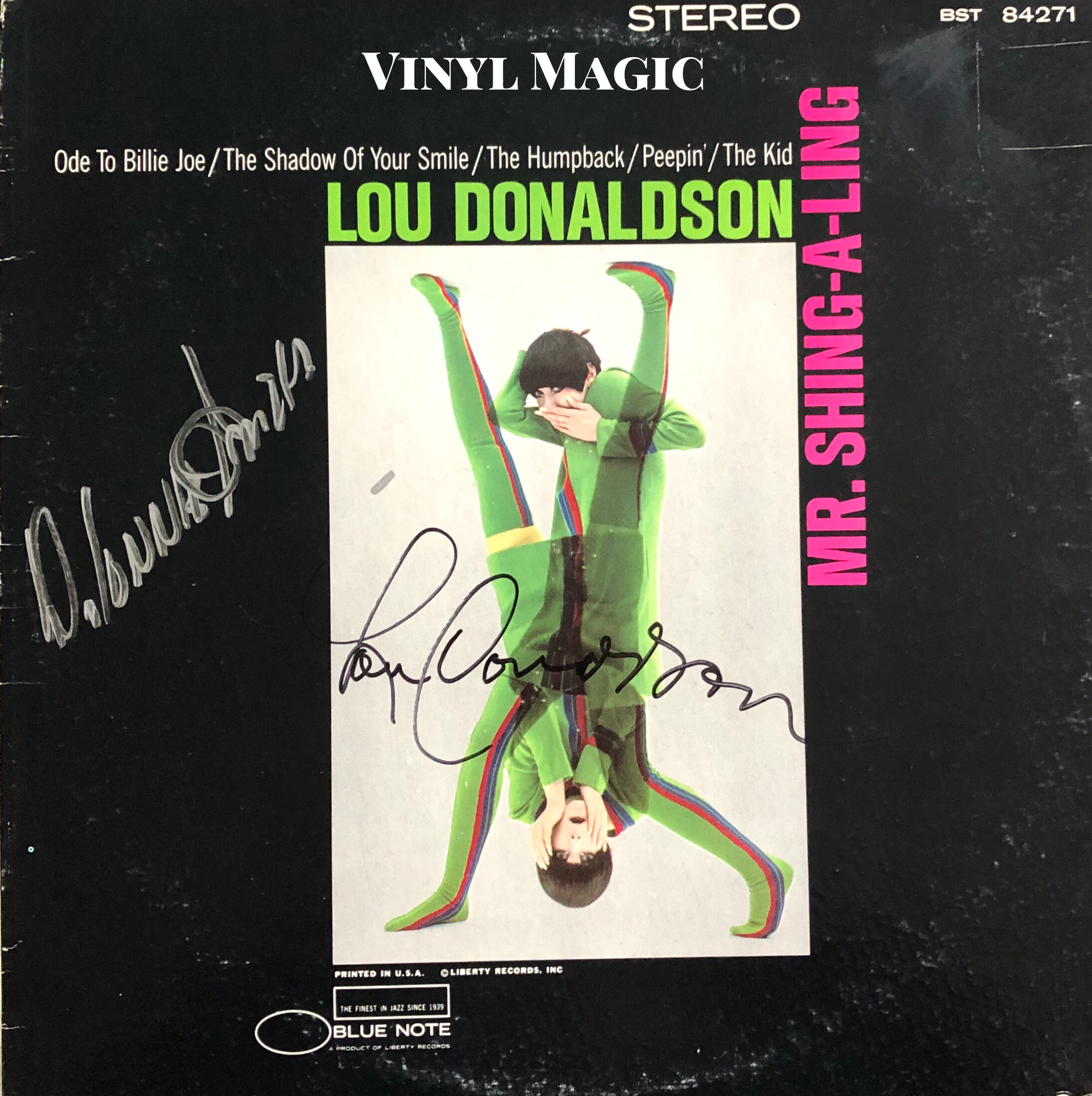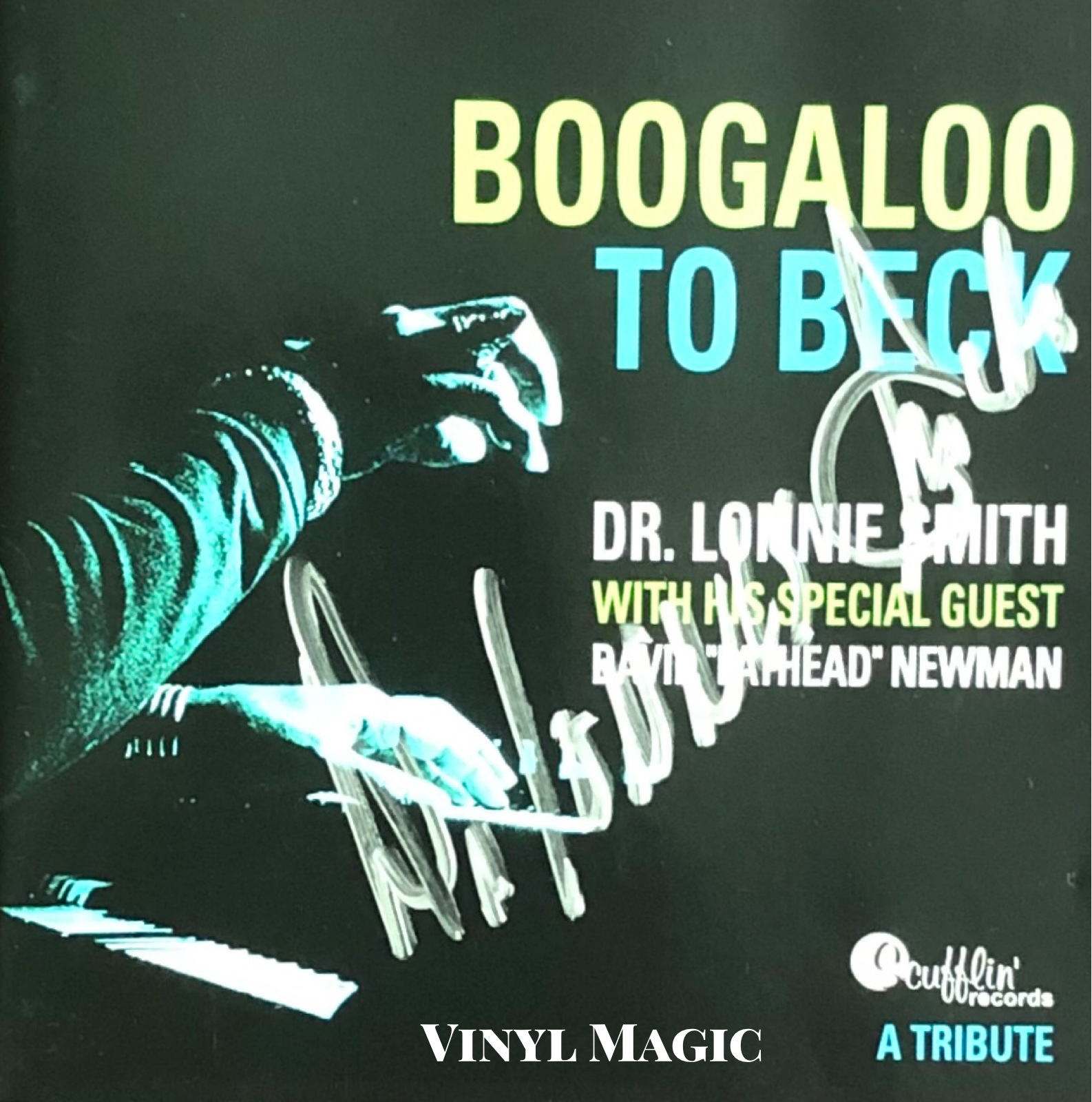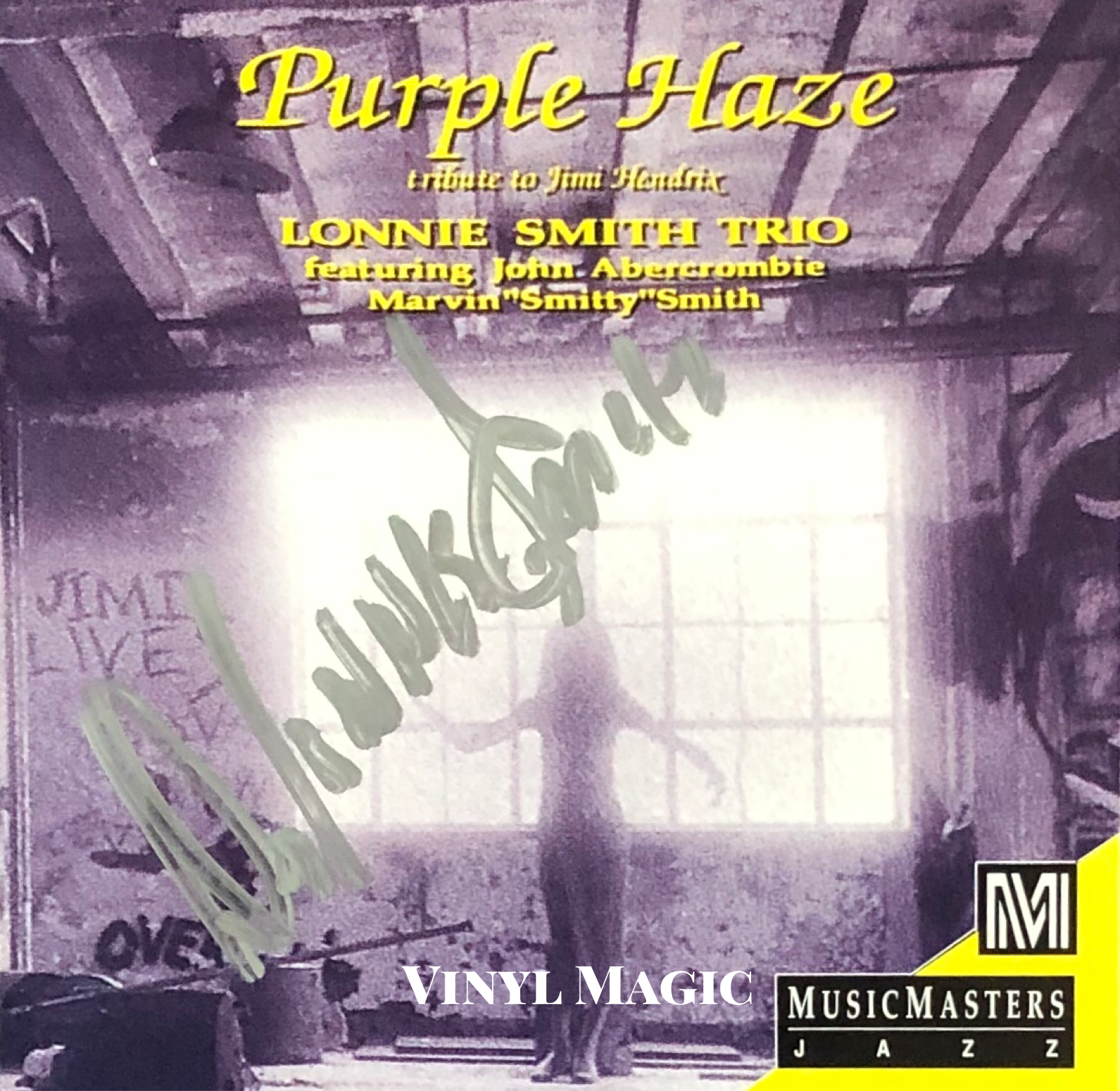Dr. Lonnie Smith and Me...
Playing with the Doctor is an improvisational experience in its truest sense, so you have to be ready at all times. The spontaneity is unbelievable. He's such an intuitive player. There's never an agenda with Lonnie. He's always looking to see what he can find on the bandstand. You have to be so in the moment, because with him things will go from solid to liquid and back to solid again. It's always evolving, so it's just thrilling to play with him, and terrifying at the same time.
guitarist Peter Bernstein
Move Your Hand (1969) signed by Dr. Lonnie
It's like I'm hearing it for the first time, like how the audience hears it. Music is not something that you practice and you get up on the bandstand and run through on automatic pilot. That's not for me. I enjoy playing too much to memorize stuff. So it's never gonna be the same when I play. I can't do it if I wanted to.
Dr. Lonnie Smith
Alligator Boogaloo (1967) signed by Dr. Lonnie, Lou Donaldson
A lot of people who come and hear me, they don't realize where the music comes from. It doesn't come from notes on the paper or anything like that. What happens is, the music comes from my toe and travels all the way up like electricity. And that's why I'm surprised when I'm playing. That's because by playing by ear, I really let my body play what's in my heart, right there on the bandstand. I play life instead of notes. I play what I lived. You should always play how you feel. If you're hurt, play that. If you're sad, play that. That's what I tell my students.
Dr. Lonnie Smith
Mr. Shing-A-Ling (1967) signed by Dr. Lonnie, Lou Donaldson
It's an extension of my being. It's a part of my lens. It breathes for me, it speaks for me. I feel every bit of the organ. It's like electricity, a fire that goes through my body. You can feel it vibrate, there's nothing like it. It lifts me up, it crawls through the pores of the room.
Dr. Lonnie Smith
Say It Loud! (1969) signed by Dr. Lonnie, Lou Donaldson
The way they do things now is a little different than what I used to do at Blue Note years ago. We used to just go in and hit it. Three hours later, you’d be done with maybe a couple of albums. You just went on and played, there wasn’t all of this fixing up like Frankenstein.
Dr. Lonnie Smith
Hot Dog (1969) signed by Dr. Lonnie, Lou Donaldson
The key to any really good composition is the melody. If you have a great melody, you can do a lot of stuff with it from an improvisational standpoint. Lots of music today is all surface - there’s a beat and a sound, but there’s no substance to it. Beck’s music definitely has a vibe and a genre, but if you strip everything away, there’s always a strong melody and good harmony. That gave me a foundation to build the arrangements upon.
Doug Munro, producer/arranger/guitarist on Boogaloo To Beck
Boogaloo To Beck (2003) signed by Dr. Lonnie
I loved that sound, It has all the elements of the universe to me. It’s sunshine, rainbows, the rain, the wind, the storm, the flowers. When I’m at the organ, it’s like sitting in a spaceship and you don’t know where you’re going.
Dr. Lonnie Smith
Everything I Play Is Funky (1970) signed by Dr. Lonnie, Lou Donaldson
Born in 1942 in Buffalo, Dr. Lonnie Smith grew up with classical music, gospel, and jazz. Music was a commanding influence. His first instrument was his voice. As he recalled, "My parents sang, my mother, her mother, her sisters, her brothers, my cousins." In high school, Lonnie played several instruments, including trumpet, cornet and trombone, and he started a singing group with his brother in the late 1950s, The Teen Kings. A future saxophone star, Grover Washington Jr., played saxophone in his band and Lonnie remembered, "I used to go over to his house and his mom had an organ. But you know, I didn't know how to mess with it. just a little bit, you know just pickin' with the instrument. But anyway, my brother and I used to sing and they played."
The band with Grover Washington Jr. and his brother was fun, but Lonnie's thirst for music was not satiated by his singing, he hungered for more. He began stalking a music store: "I used to go there all the time, I stayed in there everyday until closing time. And Art Kubera owned the music store and he said, 'Can I ask you a question, son?' And I said, 'Yes, sir.' He said, 'Why do you come in everyday until closing time?' I looked him straight in the eye and said, 'Sir, if I had an instrument, I could work. If I could work, I could make a living.' And everyday I would go in there, and one day I went in and he closed the store up and he told me to come with him. And I went with him to his house in the back of the store, and there was an organ! And my eyes lit up, and he said, 'If you can get this out of here, it's yours!' I got it, and i haven't looked back since!"
Afro-Desia (1975) signed by Dr. Lonnie
Indeed, Dr. Lonnie Smith has never looked back. As a leader and featured sideman on more than seventy albums, Dr. Lonnie has gigged with notable jazz artists like David "Fathead" Newman, Lee Morgan, Ron Carter, Lou Donaldson, and George Benson. His first vinyl appearance was on George Benson's debut, It's Uptown, and George and Lonnie recorded several more albums together, including Lonnie's 1967 debut, Finger Lickin' Good. A hallmark of jazz organ trios, Dr. Lonnie has always been supported by jazz guitarists, legends like George Benson, Grant Green, Melvin Sparks, and newer players like Dave Stryker and Peter Bernstein.
State Of The Art (1985) signed by Dr. Lonnie, Jimmy McGriff
Dr. Lonnie is neither a doctor in medicine nor is he the recipient of an honorary degree. He became "Dr. Lonnie" as a result of his formidable skills 'doctoring music', a fitting sobriquet bestowed upon him by his fellow musicians. And these skills have been applied to a wide palette of songs and sounds, everything from Aretha Franklin to The Beatles, Jimi Hendrix to Thelonious Monk, and even, 1990s enfant terrible, Beck. Boogaloo To Beck, released in 2003, is a soul jazz tour de force of songs from the Beck canon; "Loser", "Devil's Haircut", and "Paper Tiger" never sounded so funky and greasy.
Purple Haze (1995) signed by Dr. Lonnie
I saw Dr. Lonnie Smith recently at the Jazz Standard in New York City. Dr. Lonnie was leading an octet, a four piece horn section with trumpet, trombone, baritone and tenor saxophone, conga, drums and guitarist extraordinaire Dave Stryker. They played an invigorating set, including "Too Damn Hot", a soul groover meant to melt the frigid New York City weather. It did. Dr. Lonnie introduced the next song, "I wrote a song, "I Think I Am In Love", it ended up on a George Benson album. It was not on my record. They titled it 'Bright Eyes'...but, you know, that's how record companies are. Here's 'Bright Eyes', he said with a shrug and a smile. The last tune was "Mama Wailer" which started with conga, drums, and Dr. Lonnie playing bass on foot pedals laying down a filthy bottom. It was an hypnotic groove, especially when the guitar and horn section kicked in.
The George Benson Cookbook (1967) signed by Dr. Lonnie
After the show, I visited with Dr. Lonnie, a deeply soulful and peaceful man. He laughed when he saw, The George Benson Cookbook, "Look at (baritone saxophonist) Ronnie Cuber, he looks like he's trying to sell us some stoves. And we weren't buying." His eyes lit up when he signed his first recording with George Benson, It's Uptown, "That picture was taken in front of Minton's. We played some great shows there!" Minton's Playhouse was a famed Harlem jazz boite, opened in 1938 on the first floor of the Cecil Hotel on West 118th Street. It was the site of many historic jam sessions with bebop innovators, Dizzy Gillespie, Thelonious Monk, Charlie Parker and many others. I mentioned how much I loved his transformations of Beck's hip, slacker songs into soul jazz burners. "You know, I had never heard of him, but we had a lot of fun playing the music." In the liner notes, he explained the vibe in the studio during the recording, "This felt like an old Blue Note record, when we used to record a whole album in three hours. It's about looking for a feeling. You can make it technically, great, but is it just about that? I don't think so. This felt like family. Everybody was enjoying themselves, nobody was on an ego trip., nobody was uptight. It was a lot of fun, and I think it came out that way." I thanked Dr. Lonnie for his kindness and music, gathered up my vinyl and left.
It’s Uptown (1966) signed by Dr. Lonnie
Dr. Lonnie Smith, an innovative and creative wizard on the Hammond B3. Not many artists can cover Aretha, Jimi, Thelonious and Beck and remain true to their funky soul!
The Doctor is always in...
That’s What You Say! (2012) signed by Dr. Lonnie
Choice Dr. Lonnie Smith Cuts (per BK's request)
https://www.youtube.com/watch?v=NyhoCBXa4kQ
"Paper Tiger" Boogaloo To Beck 2003
https://www.youtube.com/watch?v=UrRnZECLr1Y
"Ode To Billie Joe" Mr. Shing-A-Ling with Lou Donaldson
https://www.youtube.com/watch?v=JRRIVwuKeYY
"Alligator Boogaloo" Live with Lou Donaldson
https://www.youtube.com/watch?v=ocPIzuE5-rU
"Eleanor Rigby" Turning Point 1969 Dr. Lonnie grooves The Beatles!
https://www.youtube.com/watch?v=rJ8a6yNXV9g
"Voodoo Chile" Purple Haze 1994 Dr. Lonnie grooves Jimi!
https://www.youtube.com/watch?v=oca2-uumYyI
"Spinning Wheel" Drives 1970 Dr. Lonnie swings Blood Sweat & Tears!
https://www.youtube.com/watch?v=Wib18QjR63o
"Where It's At" Boogaloo To Beck 2003
https://www.youtube.com/watch?v=LnTE8Lgjt18
"It's Changed" Afro-Desia 1975 with George Benson
https://www.youtube.com/watch?v=-QOOe5GRbaw
"Bright Eyes" aka "I Think I Am In Love" George Benson 1976
https://www.youtube.com/watch?v=9WkQXlVJ5cc
"Mama Wailer" Mama Wailer 1971
Dr. Lonnie Smith Big Band, Live at the Jazz Standard 2013














